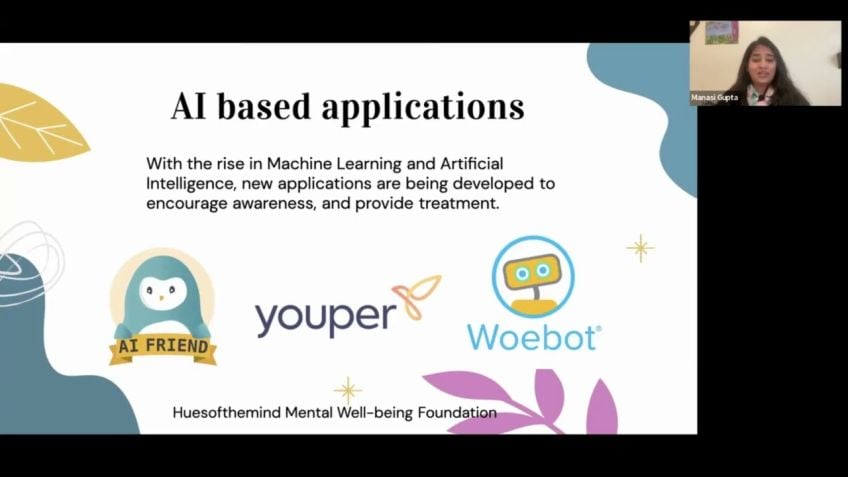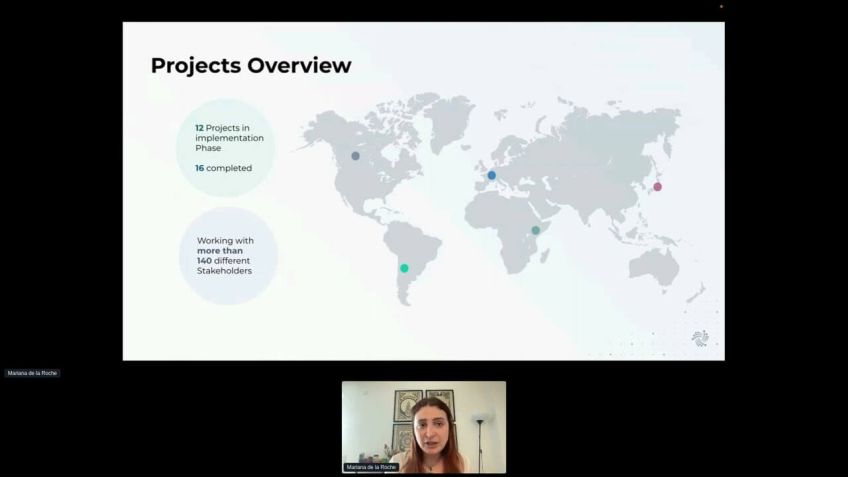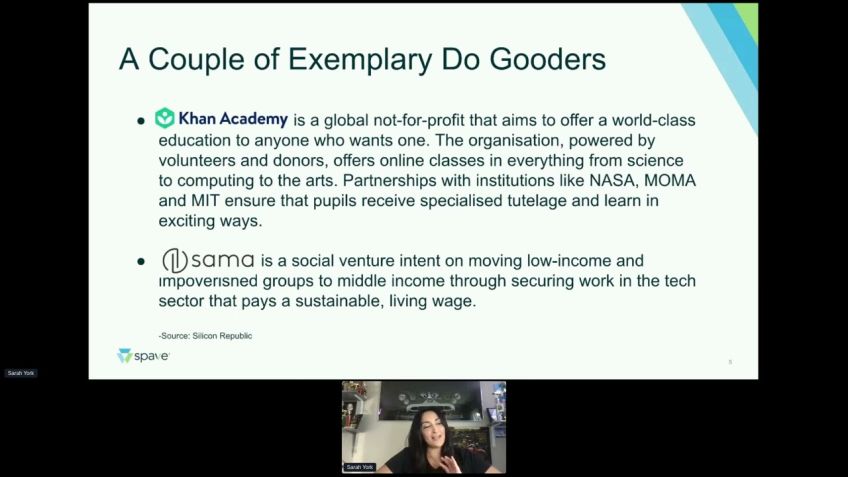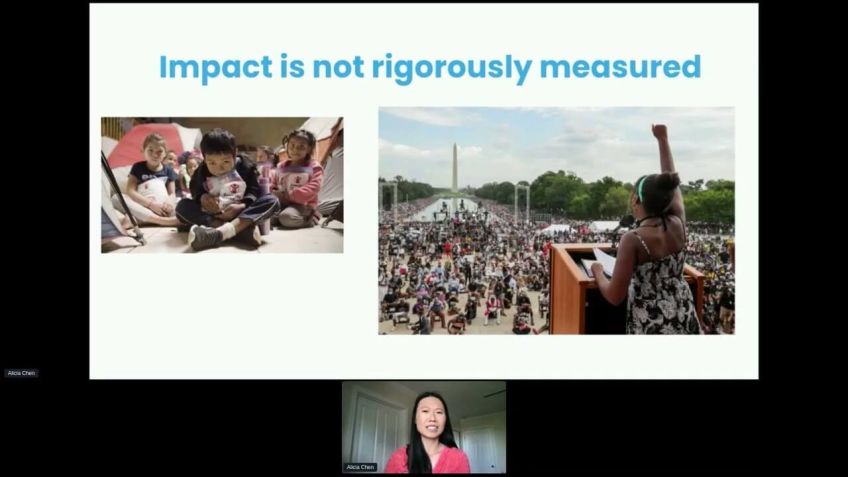When “Don’t Be Evil” Isn’t Good Enough: A Framework to Evaluate Your Next Opportunity in Social Impact Technology by Alicia Chen
```html
Translating Tech Skills into Social Impact: A Journey
Hi, there. I'm Alicia, co-founder and CTO of CoProcure, a marketplace for government purchasing. Today I am going to guide you on how my tech-based career began transforming into a robust source of social impact, underscored by the importance of technology in solving societal challenges, and helping you to evaluate such opportunities.
About Me: Who is Alicia?
I lead a somewhat busy life with two kids and a growing company which leaves mostly no time left for hobbies like rock climbing or knitting. I had commenced my career with the tech behemoth, Microsoft, where I learnt the basics of Software engineering, which lead me to join Dropbox, the first woman engineer, as a matter of fact, and was part of the journey as it grew from a 70 member team to a sturdy 2000.
Meaningful Impact through Tech
The career that I had commenced at the silicon valley, introduced me to the idea of impacting the world positively, where I started questioning, the true value I was creating for the world. This poked me towards thinking how we can disproportionately serve populations that are often overlooked by Silicon Valley.
On realizing the importance of such an Influence
Post Dropbox, I moved onto the Chan Zuckerberg Initiative (CZI) where I discovered a lot about social impact. But realized that the solution to these problems would have been approached more efficiently as a tech startup would do, creating a series of feedback loops to work it out. Hence, I decided to focus my work towards technology, and aimed to refactor the key systems in our society which aren’t working well.
Navigating the Social Impact Tech Landscape
In the process, I tried to create a framework to evaluate opportunities in social impact based on a series of questions, which includes a true North Star mission, technology being the solution, funding sources and the cultural atmosphere.
Is the Mission a True North Star?
The true North Star is your mission which can often fail if it's purely for marketing purposes or if it changes over time affecting your org, or worst-case scenario if it fails to measure the impact it's casting on society.
Is Software the Solution?
Software isn't always the solution; it depends on the problem. If you are trying to change laws or policy, or get FDA approval, even the fastest software can't speed up these slow processes.
How is the Project Funded?
Non-profits, user-funded tech companies, governments, and volunteer organizations represent various funding models and each has its own unique set of challenges to tackle.
Cultural Suitability: A Must
Last but not least, before you join any organization, evaluate whether the organization culture aligns with you. The organization should have sound product and funding strategy, strong leaders, a talented team, and a really strong culture of its own.
CoProcure: Social Impact at its Core
Lastly, talking about my own startup, CoProcure, a mission-aligned tech startup, where we live our North Star mission every day. We aim to fight the inefficiencies in government protocol of a month-long procurement cycle for everything from printers to fighter jets. Our company focuses on creating a marketplace where all public contracts are on one platform easily searchable to all, thus making public procurement slightly easier.
My Takeaway
As a concluding note, building a career focused on social impact and technology is possible but needs patience and commitment. One might need to launch something independently to truly integrate these two aspects. Remember, be selective and thorough with your due diligence. Pursue something meaningful and impactful!
```
Video Transcription
Hi, everyone. I'm Alicia. So, uh today we'll be covering why work on social impact, why work on social impact technology specifically and how to evaluate opportunities. Um So firstly, a very brief intro of myself, I'm the co-founder and CTO of co procure a marketplace for government purchasing.
Um I have two kids and because I have a company and two kids, I no longer have any time for hobbies like rock climbing or knitting or reading. Um And you'll learn all about my career shortly. Um So maybe brief survey for those who are here. Um What are your goals for your career just to know who my audience is? Uh You just drop them in the chat if you're inclined to, um are you thinking of making some cutting edge technology that will shape the future? Uh maximizing for personal growth at a fast growing org. Um Is anyone already prioritizing mission or at least a little curious about it? I assume. So if you're here anyway, feel free to drop them in or not. Um But for myself, I've always kind of assumed that I would build my career first. Uh And then maybe I would retire and make a lot of money. And then I would donate that money and maybe I would volunteer in my spare time. But really, I had friends who got into social impact tech, like right away. And I was like, oh, that seems smarter. I could do this now. Um So I, you know, at the beginning did end up building my career. Uh I started at Microsoft where I really learned the basics of software engineering. Um And then I was at Dropbox. Uh Fun fact, I was actually the first woman engineer at Dropbox. So I saw it.
Uh I saw it grow from about 70 full time to about 2000 full time. And that's really where I learned to build a product and a team and understood how to build a company. Um But Silicon Valley is also where I was exposed to the idea of, you know, making the world a better place, uh whether that's real Silicon Valley or HBO Silicon Valley. Um But at Dropbox, I really started to wonder, you know, because they talked about making the world a better place and I was like strong engineering team with great people. Yes, business impact with tens of millions of users. Yes, but actually making the world a better place is more like eking out 3% more productivity from white collar workers. So not really my definition, um Silicon Valley disproportionately targeting people who already have a lot, whether that's at work um or in their personal lives.
And I really wanted to think about how to disproportionately serve populations that were being overlooked by Silicon Valley. I mean, what are tech companies really doing for working class people and vulnerable populations? And so I decided to leave dropbox. Um And I wound up at the Chan Zuckerberg initiative where I learned all about social impact. And, you know, we looked into a lot of thorny societal problems like everyone is talking about climate change, but not only do we need to fight climate change, but also the social injustices that happen as a result of climate change where the top 1% of earners are disproportionately creating pollution and carbon emissions.
And uh people of color and low income, people are paying the price um globally as well as in the United States or government inefficiency. Why does our bureaucracy in America work so poorly that it takes almost four years for a veterans insurance appeal to be processed? And veterans are literally dying while waiting for the paperwork to come through. Um So at CZI, I worked on a lot of different kinds of problems and worked with a lot of different types of organizations. But I found that while the problems were very interesting. Um And thorny, as I mentioned, the way that I wanted to tackle those problems were more uh the way a tech start up would um you know, find a user who has a problem solve that problem iteratively and create a positive feedback loop where by providing value to your users, you get the opportunity to keep building, which is not really the way that philanthropy and nonprofits typically work um or governments for that matter.
Um I also wanted to have my impact via technology. I like to move fast. I'm very impatient. I like to build solutions that scale. You know, I could have been a doctor or a teacher actually. No, I couldn't, I don't have enough patients. Um And those are, those are roles that impact people on a personal level. I wanted to do something at scale. I wanted not just to put bandaids on top of existing symptoms, but really to refactor major systems in our society that aren't working well. Um So what I really ended up exploring was the intersection of social impact and technology. But here be dragons. Uh I've been burned. I've been disappointed. I spent a long time looking a long time in my book is like two years, give or take. Um And in the end I ended up co founding my own start up. And so that leads me to this point in my career where I co procure, I'm putting it all together. Um But to save you all some work, uh this is essentially the cliffs notes of what I learned during my exploration, um a framework for evaluating opportunities and social impact. And so it comes down to four questions. We'll go into each of these in more detail. First is the mission um a true North Star uh two. Is it really a technology problem? Three. How is this organization funded? And four, is it a great place to work? So, one is the mission, a true North Star. There's several versions of failure. Here.
One is the mission is just marketing. There's lots of ways to run a successful company that aren't better for the world and priorities change over time. So if your if social impact is not the North Star, it's easy to wander or there may be even just it's pure marketing from the get go. Um could also be a North Star for your team but not the whole org. So everyone immediately around you wants to make the world a better place. But the top brass is still really prioritizing, making the company a lot of money. It's really easy. Uh in this instance, for conflicts of interest to hamstring your progress or for your whole division to get cut because it's not contributing to the bottom line enough. So, pretty common for the social impact wing of a bigger company. Um And then the last issue which is a lot harder to find out and harder to fix is impact isn't rigorously measured when you're talking about root causing really tough problems. It's not as easy as give $10 feed a child for a month. So, you know, if we change the education system or help people find better housing, is that actually changing their life outcomes. And you know, in many instances, people wanna see heartwarming pictures or they just want to be part of something that feels really principled.
It's much less exciting to talk about science and randomized controlled trials and whether or not those actions are actually having the outcomes that you want moving on to the next problem. Uh Is it really a technology problem? Code is fast and laws are slow. So no matter how fast you ship your next feature, it's not really gonna help you do things like pass laws uh win elections, change policy, get FDA approval or change hearts and minds. So you really have to ask yourself whatever problem you're trying to solve. What is the blocker to making this happen? Because if it's one of these things and it's not software, um software isn't necessarily gonna make that big of an impact. And it's not to say that these kinds of efforts aren't important, but the question is, should you try to apply technology or should you use another tool like starting a movement or lobbying congress? Uh And it's also a question of how much patience you have because progress is measured in decades, not in sprints. So, you know, you can stand up a website and then go to a whole another company and then come back and they'll still be working on it. Another is that the culture clash is real. In tech companies, there are concepts that we take for granted that if you work in a nonprofit or in the government, you'll either have to personally evangelize these things or just learn to do without.
The next issue is how is this thing funded? Um Every funding model has its unique problems, so we'll go through them one by one. If you're working at a nonprofit, as I mentioned, funding is not tied to user value. So there's not a positive feedback loop. Donors are different than end users, which means that you have to keep two different groups of people happy. These two different groups often have, you know, different ideas of what should be done. And when push comes to shove the more important group for your survival to please is actually donors. Uh And there's no such thing as hockey stick growth, you have to get new users and then separately you have to get money. Um Another funding model is the user funded tech company. Typically you charge your users for, you know, providing some product or service. But the question, especially if you're looking to serve vulnerable populations, are do your users have enough money? Um Because if they don't and you need to make money, then oftentimes you'll find yourself catering to users who do have money. So for example, your company might start with the aspirational mission of providing free classes to the unemployed. And then in an effort to stay afloat, monetarily, you end up pivoting to providing paid classes to upskill people who already have jobs so hard to stay true north in this situation. Another way you could get funding is to work in the government.
Uh The government has lots of money and it serves all populations. Um and disproportionately serves vulnerable ones. Uh The nonprofit sector is only 5.4% of us GDP while government is 17%. So it's big. Uh and you can enter programs like the U sds or A T and F to directly apply your technology skills in government. The issue with government, as you probably know is it's super slow. Uh The there really is a huge culture difference and red tape and all kinds of policies that make it hard to iterate the same way you do as a tech start up. So in between those two is GOV tech, you know, don't work in the government, you can work with the government and then you can sort of maintain your own culture and all of those things. But the issue with GOV tech typically is that there is a month long procurement cycle that you have to go to through. In order for governments to adopt your technology, the sale cycle is a minimum of four months, typically much longer and no government really wants to innovate and go first. And so uh basically, you have to go through this month long cycle again and again and again.
So good luck finding product market fit and making enough money before you go bankrupt. And lastly, no money, no problem. We'll just run a volunteer organization. But the problem with that is if you want to have meaningful change, you have to put in sustained effort over long periods of time. And usually you will need the trust of, of established institutions. But hospitals, schools and governments aren't gonna deeply integrate a team of volunteers.
They could disappear at any moment and leave the government holding the bag. And so uh they just won't do it. But deep integration is what's necessary for real impact. So a a wide array of funding problems last but not least, uh is it a great place to work because wanting to do good doesn't make up for fundamental flaws in an organization. So in order for you to be happy there and for this group to be effective at what they want to do, you still have to make sure that they have sound product and funding strategy, strong leaders, an amazingly talented team and a really strong culture. Uh I'll go through two of the more common pitfalls I saw um one is product market fit uh just because something benefits the greater good doesn't mean it'll get adopted. So you have to ask yourself, is this solution great for students but really hated by teachers and school admins. Is it better for citizens but worse for public servants. If so, that's a bolder, you're gonna be pushing up hill forever and uh it's gonna make it really hard to have a strong go to market strategy if that was something you were even thinking about. Um, another common issue is early team DNA.
Uh You want to make sure you have the right set of coverage. You don't want to have a bunch of technologists who are just trying to disrupt the status quo without really understanding what it is. And you also don't want to have a bunch of domain experts who are clueless about building technology and a strong technology team. Both of them are probably doomed to fail. So don't skip your due diligence just because you're gonna work on something that's meaningful and gonna save the world. So at this point, you're probably saying, hey, Alicia, you're hunting for Bigfoot. These kinds of organizations don't exist. Well, they do, but in my case, I did have to start it. And so this is where I'll talk a little bit more about uh the start up that I work at um co procure because for us, the mission is a true North Star. My co-founder and I both arrived at this idea because we wanted to have social impact at scale. But the problem we're tackling is not obvious, it's both not an obvious problem and not obviously a social justice problem. Um So a little bit more about what we do. Procurement is a $2 trillion a year industry at the state and local level, that's 9% of GDP that goes towards paying for goods and services like school lunch and buying electric buses and so on. Um And it's a huge part of policy implementation.
You can't fight climate change or run a government healthcare system without procuring like appliances and software and contract staffing. Um But the way procurement works these days is uh you know, not like going on Amazon or Yelp to use the internet to buy stuff, but instead they write up like 1000 pages of specification and then they put it out there and they let vendors come to them with their bids, they're legally required to wait for a minimum of four months.
Um And it's considered a good day, especially if you're a small agency. If you get even three qualified bids, oftentimes it's zero or one. And in many places, the policy is such that you have to accept, you're legally required to accept the cheapest piece of junk that someone is offering you that meets all of the requirements. So this is how the government spends $2 trillion a year and you can see how this results in many of the inefficiencies. Um That's how we buy everything from, you know, printers to fighter jets. Um Now, uh the way co procure is solving, this is a purely technical solution. What you can do is that you can actually skip over the four month long bidding process by piggybacking on another government agency's existing contract. Um There will be a recording later. Uh You can um piggyback on another agency's existing contract. Um This is a legal and widely known practice. It's just very inefficient because the way they're doing this search now is by calling and emailing each other. I joke that it's algorithm of Gofish. And so if you're looking for desks, you call them up, you're like, do you have a contract for desk? Do you have a contract for desks? Um So really apply technology, you put all the contracts in one place, you make them searchable for Silicon Valley.
It's actually a pretty simple problem. Um And the funding is pretty well solved. It's a $2 trillion market, as I said, and we're starting with a $200 billion niche in uh cooper purchasing. And we plan to monetize on the supplier side, which means that we don't have to be procured by government. So we can grow virally as fast as any, you know, s a company can. And obviously I'm pretty biased, but I think it's a great place to work. We have strong product market fit, we have 35% quarter over quarter growth. So we have shown that it actually can work. It's better for buyers, it's better for suppliers, it's better for the public good. And it's taking like crazy. Obviously, I'm biased. I think we have a great team. Um And my point is you can have your cake and eat it too. Uh You just might have to ask a lot of questions. Um You will probably have to keep searching if your initial few options don't meet the criteria you want. And in the end, you might have to start something yourself. That's it for my talk. Um Does anyone have any questions? Uh Yes. Are we A B Corp? Um So we are not currently a B Corp. We are um I think at the time that our company was started, we didn't know about B Corps. We have investigated that.
I think there's a difference between A B Corp which I think is more just like a signaling of intent um versus a public benefit corporation, which actually has some legal benefits. Um And so that is something we will look into in the future for now. I think we just want to survive. Yes. Um So we are currently neither, but that's something we will explore. Again. We didn't even know that was a thing. We're both first time founders also uh for anyone who's here um would love to connect with you via linkedin. Um And these uh this talk is actually available as an article. Um And I will also share the slides and it is being recorded. So I think the youtube video will be available afterwards sometime if you want it, you can connect with me and I will send it to you. Um Let's see, here is the original article that this is based on uh regarding, do I like working on start ups better than my former organizations? Um I think each had their benefits. Quite nice to start my career at Microsoft. Um It had a lot of support for learning as a software engineer. Um Like honestly out of school, I had no idea what I was doing, but my manager was very helpful. Um And there were just classes on how to software engineer.
Um Dropbox was a good change because it was just way faster. There was a lot more learning by doing a lot less support. So it was good that I kind of, you know, already knew a little bit, but for some people, I think it's a great option to start right off the bat. Um I think for a small start up, you will get a lot of, a lot of variety, small start ups can expand the whole spectrum where I really like to go is a hypergrowth organization because everything is growing and changing all the time and you get lots of opportunities to learn and do things yourself and wear different hats.
So at a start up, you know, you might end up in sort of the same product market fit loop for a long time and never really get traction. Um and never really grow So you don't get to learn things like how to build a culture or healthy processes for a larger organization or hiring. Um But you will get all of those things at a fast growing organization. The trick is finding some, some place that is in hyper growth. So, yeah, I that's where I looked for my career. Um I think Dropbox and hopefully Coro cure um Dropbox basically doubled in every stat every year that I was there over about five years. Um And Coper is aiming to do the same. So lots of learnings hypergrowth companies and identification thereof. Um It's uh you can definitely hear the company talk about their metrics. Um We offer for most of our new hires to talk to our investors because you can tell from, you know, an investor's track record and then what they think about the company. Um So I think one of, one of our big bragging rights is uh one of our early investors. Uh One of our investors was an early investor in the likes of Facebook, Airbnb Dropbox. Um And he thinks that we are the hottest thing in his portfolio.
So that, that is, that is how I knew it was a good thing when I joined. Um But otherwise, yeah, looking at their metrics. Um and really asking those questions about like the business, is it sound, how is it growing? What is their culture like? All right. Well, it's been fun. Thank you. All so much for listening to my talk and, uh, have a great rest of your day or evening or whatever it is where you are. All right.





